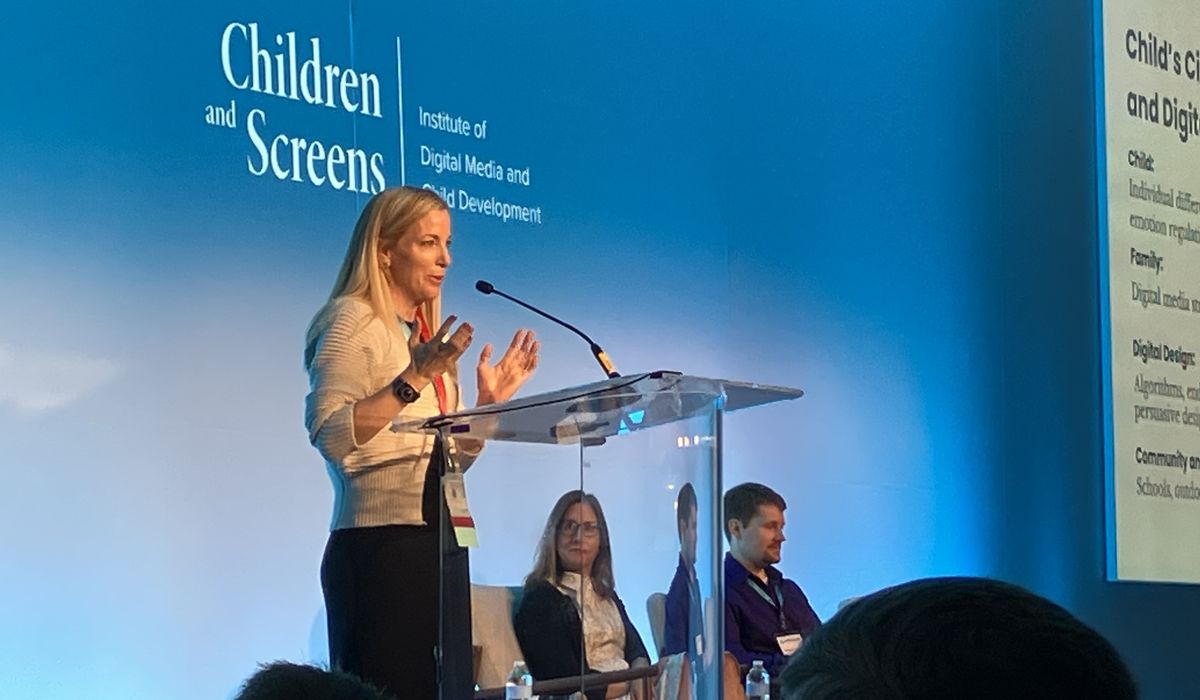


Parents increasingly are scrolling through social media with one hand, feeding their children with the other and keeping their eyes on their screens while doing both.
Social scientists call it “technoference,” or digitally distracted parenting. Researchers speaking at the Digital Media and Developing Minds conference in the District this week warned that it’s on the rise as artificial intelligence improves.
“Technoference hurts the relationship between parents and children because the more they’re on devices, the less they’re building the skills necessary to be fully human,” said Kris Perry, executive director of Children and Screens, the nonprofit research network that hosted the gathering.
A former child abuse investigator in California, Ms. Perry said research has shown the “demonstrated harms” of technoference to children’s mental, emotional and physical health. Such harms range from inattentiveness and emotional outbursts in young children to sleeplessness, anxiety and depression in older teens.
Most recently, adolescent boys have gotten hooked on Polybuzz, an AI-powered chatbot that sends them sexually suggestive messages late into the night.
“The issue is that it’s rated for 17+ and we know that a lot of kids way younger than that are using it, along with a host of other similar products that have adult-oriented content,” said Scott Kollins, chief medical officer at Aura, a Boston-based app that helps parents monitor children’s digital use.
In April, the Pew Research Center reported that 48% of children aged 13 to 17 said social media had a “mostly negative” impact on people their age, up from 32% who said the same in a 2022 survey.
“Technoference is like distracted driving,” said Dr. Dimitri Christakis, a Seattle pediatrician and chief science officer at Children and Screens. “It’s part of a large, uncontrolled social media experiment on children that’s about to get a lot worse with AI.”
More than 300 researchers, teachers, scientists, medical specialists, social workers and government officials participated in Tuesday’s conference. They noted a surge of extreme violence, sexually explicit content and addictive gambling-style features in digital content available to children.
“There’s been this idea that something interactive is better than something passive,” said Caroline Fitzpatrick, a developmental psychologist who traveled to the conference with her students from Sherbrooke University in Canada. “But watching ’Sesame Street’ for half an hour may be better than watching YouTube videos. Television doesn’t have an algorithm that finds what you like and feeds it to you before you can think about it.”
Sheri Madigan, a developmental psychologist at the University of Calgary, noted during a morning panel on screens in early childhood that the average number of internet-connected devices per household has jumped from 10 before the pandemic to as many as 25 today.
Research has long shown that parental screen time is the strongest predictor of children’s screen time. She said that explains why children up to age 8 are now averaging 3.8 hours a day of recreational screen time — far more than recommended — as they mimic the habits of their parents.
“So we’re seeing that screen time is the culprit … and not the other way around,” Ms. Madigan said.
She co-wrote a 2021 study in JAMA Pediatrics that found behavioral problems surged in children while language skills, physical activity, sleep and grades worsened with higher levels of screen time.
’Hypnotic power of the algorithm’
Brandon T. McDaniel, a senior research scientist at Parkview Mirro Center for Research and Innovation in Fort Wayne, Indiana, said it’s essential to challenge parents to reduce screen time without shaming them.
Funded by grants from the National Institutes of Health, he said his research shows that parents “feel empowered personally” by escaping into social media, even as they perceive “technoference to be occurring.”
“We can’t just tell them to make intentional decisions [about digital technology], because it’s designed to keep you from making intentional decisions,” Mr. McDaniel said.
Twelve states have passed or enacted bell-to-bell bans on student smartphones in K-12 schools. They include Virginia and New York, which will begin enforcing the largest statewide ban this fall.
At the end of a debate on the wisdom of these bans, 51% of conference attendees voted in support of them. Another 41% expressed opposition to banning phones throughout school hours and 8% were unsure.
“On the ground, what [allowing smartphones] always results in is kids tuning out on TikTok,” said Daniel Buck, a research fellow at the conservative American Enterprise Institute and former middle school teacher. “Teachers cannot compete with the hypnotic power of the algorithm.”
Josh Golin, executive director of the independent children’s media watchdog Fairplay, joined Mr. Buck on stage to argue for the wisdom of banning smartphones all day on campuses.
He noted that lower-income families report higher levels of screen time than their high-income peers, refuting claims that it hurts poor children to take away their phones between learning periods.
“This is a common-sense approach to making teaching a little easier and to making learning more compelling,” Mr. Golin said.
But Dr. Carlene MacMillan, a child and adolescent psychiatrist at Fermata Health in Brooklyn, said phones are “a lifeline” for low-income kids and it’s better to teach them responsibility.
“Phones don’t cause the education crisis and banning them won’t fix it,” Dr. MacMillan said.
According to the experts, the best way to escape technoference is for parents to put down their phones during meals and other interactions with their children. They recommend hiking, reading and talking with children instead.
“The smartphone was designed by the smartest engineers and behavioral scientists to be compelling in a way television and radio never were,” said the pediatrician Dr. Christakis, an investigator at Seattle Children’s Research Institute. “At best, it’s a waste of time, and that’s not good for children because other things need to be happening developmentally.”
• Sean Salai can be reached at ssalai@washingtontimes.com.
